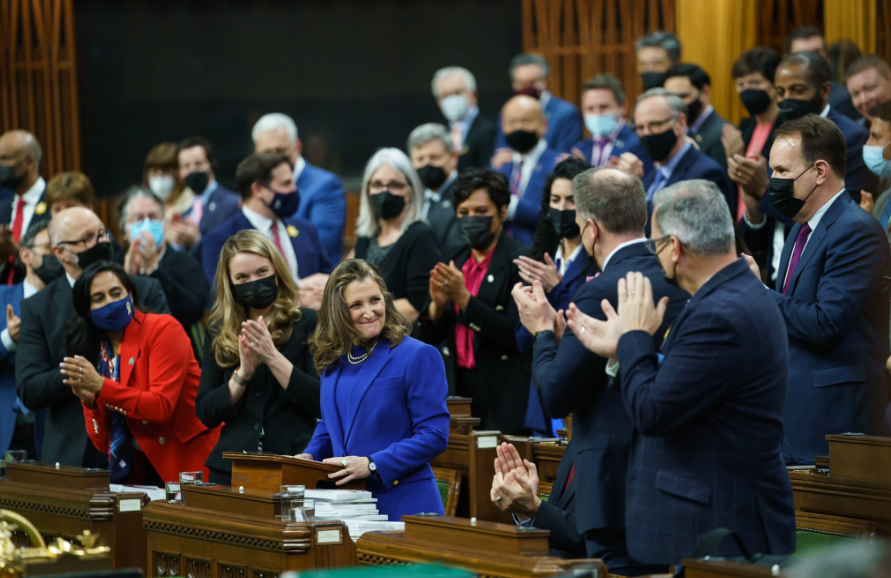Does Budget 2022 serve the public good?
Let’s look at some of the numbers.
Notably, Budget 2022 has promised more than $8 billion in new funding for the military over five years on top of the $553 billion over 20 years that was promised in 2017.
While the Liberal government had previously promised to increase the military’s annual budget to $32.7 billion by 2026-27, Budget 2022 now projects that amount to surpass $40 billion that year.
Among the big tickets items to be purchased with this money are 88 Lockheed Martin F-35 warplanes (with an estimated cost of $76.8 billion over 30 years) and armed drones (with a purchase cost of up to $5 billion).
With its stealth technology, the F-35 can be used as a first-strike offensive weapon, while armed drones would see Canada acquiring the technology that the United States has used to kill up to 17,000 people, including 2,200 children, in its operations.
Commenting on the increase in military spending, NDP leader Jagmeet Singh said: “Our armed forces do not have the equipment to do the work they need to do. We did foresee an increase in spending that makes sense.”
And while mainstream media commonly references that this spending increase does not meet the 2 per cent of GDP threshold, an arbitrary calculation at best, the military budget will see an almost immediate new cash infusion of $1.025 billion in 2023-24.
In response to the budget, the Canadian Association of Defence and Security Industries (CADSI), the industry voice of more than 900 “defence and security companies” in Canada, says: “We’re encouraged by these investments.”
CADSI would have undoubtedly wanted to see billions more, as the corporate Business Council of Canada lobby group had called for, but Budget 2022 represents a profitable opportunity for the companies it represents.
In other significant areas, Budget 2022 also proposes a new fossil fuel-carbon capture subsidy of $2.6 billion over the next five years and then $1.5 billion annually through to 2030.
This spending is on top of the nearly $18 billion in subsidies the federal government announced for the oil and gas sector in 2020.
It also comes the day after the federal government approved the $12 billion Bay du Nord offshore drilling megaproject that could extract one billion barrels of oil in deepwater about 500 kilometres off the coast of St. John’s.
In one sharp contrast, Budget 2022 offers $300 million in 2022-23 for dental care for those under 12 years of age with no co-pays for families with an annual income under $70,000. Over a five year period, $5.3 billion will be spent on dental care.
Another contrast is the $475 million budgeted in 2022-23 for “direct support for those in housing need” with $0 budgeted for the next four years. The government has framed this as “a one-time $500 payment to those facing housing affordability challenges.”
Budget 2022 also proposes $5.1 million to ensure the RCMP “can support community-led responses to unmarked burial sites” and $9.5 million to the Department of National Defence to “align its operations and engagement with Indigenous peoples” the United Nations Declaration on the Rights of Indigenous Peoples Act.
In other words, millions will go to the state bodies that forcibly removed children from their families to send them to residential schools and displaced peoples from their lands for military bases.
And despite Secwepemc land defenders rejecting the Trans Mountain pipeline on their unceded territory in British Columbia and more than 800 water protectors arrested in the United States for opposing the Line 3 pipeline, Budget 2022 proposes $27.9 million over the next two years for Natural Resources Canada to establish “advisory and monitoring committees” for “Indigenous communities” to “provide informed advice on these projects.”
As a reminder, the federal government purchased the existing Trans Mountain tar sands pipeline infrastructure for $4.5 billion in 2018. At that time, it was expected to cost $7.4 billion in public dollars to expand to an 890,000 barrel per day pipeline. In February, the construction price tag reached $21.4 billion.
Funding for dental care, housing and other social programs is needed, and yet on balance, the proportionality of funding allocated in Budget 2022 is not a win that serves generations to come. It is not only unsatisfactory, it’s arguably dangerous.



